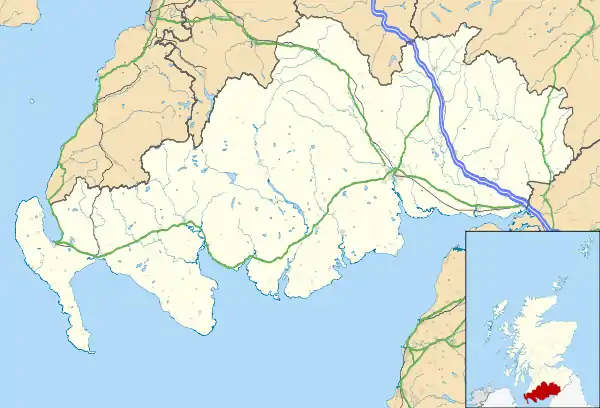Kirkgunzeon
Kirkgunzeon (Scottish Gaelic: Cill Fhionnain) is a village and civil parish in Dumfries and Galloway, south west Scotland. The village is 10.4 miles (16.7 km) south west of Dumfries and 4.1 miles (6.6 km) north east of Dalbeattie. The civil parish is in the former county of Kirkcudbrightshire, and is bounded by the parishes Lochrutton to the north, Urr to the west, Colvend and Southwick to the south and New Abbey to the east.
Kirkgunzeon
| |
|---|---|
 Kirkgunzeon | |
 Kirkgunzeon Location within Dumfries and Galloway | |
| OS grid reference | NX865666 |
| Council area | |
| Lieutenancy area | |
| Country | Scotland |
| Sovereign state | United Kingdom |
| Post town | DUMFRIES |
| Postcode district | DG2 |
| Police | Scotland |
| Fire | Scottish |
| Ambulance | Scottish |
| UK Parliament | |
| Scottish Parliament | |
Kirkgunzeon is recorded in c.1200 as Kirkwynnin.[1] Wynnin represents a Cumbric form of the Gaelic Finnén, a diminutive of Findbarr.[1] William J. Watson takes this to be Findbarr of Moyville.[1] Thomas Clancy argues the name commemorates Uinniau a local British saint, not recorded in literary records.[2]
Government
Kirkgunzeon Community Council is one of 23 community councils in the Stewartry district.[3] The community council serves an estimated population of 319.[4] The maximum number of voting members of the community council is 11.[4]
Kirkgunzeon is in electoral ward 06 Abbey.[5] It is part of the Dumfries and Galloway county constituency in the Parliament of the United Kingdom and part of the Galloway and West Dumfries constituency of the Scottish Parliament (Holyrood).
Education
Kirkgunzeon Primary School serves the village and surrounding area as well as children from the district of Beeswing.[6] The school is partnered with Colvend Primary School and Palnackie Primary School; these schools share a headteacher.[6] Children from Kirkgunzeon attend Dalbeattie Primary School Nursery.[7]
The present school building was built in 1964.[6] It is a single storey building, with two classrooms.[6] It has capacity for 47 pupils.[8] The previous school building, now a dwelling, was on the other side of the river in the original village of Kirkgunzeon.[9] It served pupils up to the statutory leaving age from the start of compulsory education in 1972 until 1945, after which it became a primary school.[9]
The First Statistical Account of 1791-99 records one school and one school master in the parish.[10] The Second Statistical Account, written in 1844, notes that there was also a school "at the lower end of the parish", built by the farmers at their own expense.[11]
Religious sites
Kirkgunzeon Parish Church held its final service on Sunday, 13 October 2013.[12] The Church of Scotland congregations of Kirkgunzeon and Dalbeattie parishes were officially joined on Wednesday, 16 October 2013.[12] Kirkgunzeon had previously been linked with Lochend and New Abbey church of Scotland on 24 June 2009.[13] This link was severed on 25 September 2013.[13]
On 4 August 2015 Dumfries and Galloway Council received an application to alter the church building to a dwelling.[14]
Cultural references
Kirkgunzeon railway station is mentioned briefly in Dorothy L. Sayer's novel The Five Red Herrings, which is set in Galloway.[15]
References
- Watson, W. J. (1926). The Celtic Place-Names of Scotland. Edinburgh and London. p. 165. Archived from the original on 21 August 2014.
- Clancy, Thomas Owen (2001). "The real St Ninian". The Innes Review. 52: 17, 20. doi:10.3366/inr.2001.52.1.1.
- "AMENDED SCHEME FOR THE ESTABLISHMENT OF COMMUNITY COUNCILS IN DUMFRIES & GALLOWAY". dumgal.gov.uk. 2014. p. 2 (16). Retrieved 2 January 2016.
- "Community Councils: Kirkgunzeon". info.dumgal.gov.uk. Retrieved 27 December 2015.
- Communications Unit, Council Offices. "Polling places". Retrieved 27 December 2015.
- Communications Unit, Council Offices. "Kirkgunzeon Primary School". Archived from the original on 5 March 2016. Retrieved 27 December 2015.
- "Zoned Nursery Classes". dumgal.gov.uk. 2012. Archived from the original on 9 December 2014. Retrieved 2 January 2016.
- "Dumfries and Galloway Primary Schools Capacity Information". Archived from the original on 5 March 2016. Retrieved 27 December 2015.
- Lindsay, Alan W. (1959). "Chapter 20: The Parish of Kirkgunzeon". In Laird, John; Ramsay, D.G. (eds.). The Stewartry of Kirkcudbright. The Third Statistical Account of Scotland. 14: The Counties of Kirkcudbright and Wigtown. Glasgow: Collins (published 1965). p. 217.
- Heron, James (1793). "Parish of Kirkgunzeon". In Sinclair, John (ed.). The Statistical Account of Scotland. 7. Edinburgh. p. 192.
- Crocket, John (1844). "Parish of Kirkgunzeon". The New Statistical Account of Scotland. 4. Edinburgh and London: William Blackwood and Sons (published 1845). p. 222.
- Lewis, Trish (3 October 2013). "Kirkgunzeon Church to close". Daily Record. Retrieved 27 December 2015.
- Russell, Sally (25 September 2013). "Presbytery of Dumfries and Kirkcudbright: Reports for the meeting on 25th September 2013 (Item 6: Ministry and Resources Committee Report)" (PDF). Presbytery of Dumfries and Kirkcudbright. Retrieved 27 December 2015.
- "Dumfries and Galloway Council: Weekly list of applications received for the period 31/07/2015 to 07/08/2015". Archived from the original on 6 September 2015.
- Sayers, Dorothy L. (15 October 2009). Five Red Herrings: Lord Peter Wimsey Mystery. Hodder & Stoughton. ISBN 9781848943711.
Further reading
- Gillespie, J. E. (1912). "Notes on the Parish of Kirkgunzeon" (PDF). Transactions and Journal of Proceedings of the Dumfriesshire and Galloway Natural History Scoeity. Second Series. XXIV. Archived from the original (PDF) on 31 August 2014.
- Reid, R. C. (1930). "The Early Ecclesiastical History of Kirkgunzeon" (PDF). Transactions and Journal of Proceedings of the Dumfriesshire and Galloway Natural History and Antiquarian Society. Third Series. XIV. Archived from the original (PDF) on 31 August 2014.
| Wikimedia Commons has media related to Kirkgunzeon. |